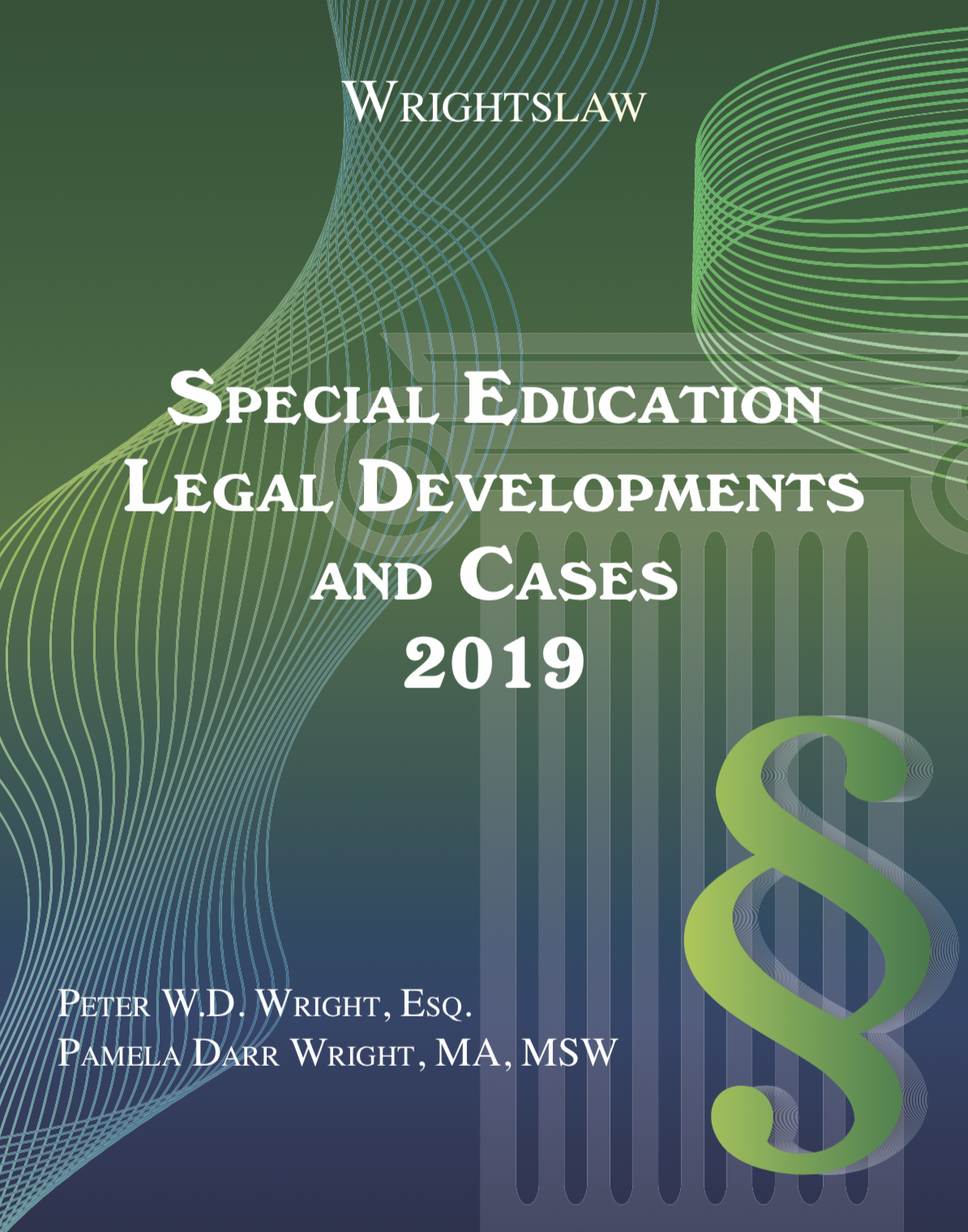Home
Date: Dec. 6, 2005
Issue: 332
ISSN: 1538-3202
|
Subscribe
|
|
|
At
Wrightslaw, our mission
is to help you gain the information and skills you need to navigate
the changing world of special education.
In this
issue of The Special Ed Advocate, we look at specific learning
disabilities, discrepancy and response to intervention models,
and answer your requests for help.
Subscribers on December 6, 2005:
47,746
The
Special Ed Advocate newsletter is free - we hope you will
forward
this issue or the subscription
link to your friends and colleagues so they can learn about
special education law and advocacy too. We appreciate your help!
Download this issue. All newsletters published in 2005
1. What You Need to Know About IDEA 2004: Learning Disabilities, Discrepancy & Response to Intervention (RTI) Models
Did you know that more than half of all children in special education programs are identified with specific learning disabilities? For years, experts have questioned the use of discrepancy models to identify children with learning disabilities.
Almost all children can learn if taught appropriately. Many children do not get appropriate instruction because their teachers are not adequately prepared. Some experts claim that most children identified with specific learning disabilities are actually "victims of poor teaching."
When
Congress reauthorized IDEA, they listened to these experts. IDEA
2004 includes changes in how children with specific learning disabilities
may be identified. How did the law change? Is IDEA 2004 the death
knell for discrepancy models?
We attempt to answer these questions in IDEA
2004: Specific Learning Disabilities - Discrepancy and Response
to Intervention Models.
Read more articles in the What
You Need to Know About IDEA 2004 series.
Learn more
about IDEA 2004.
2.
Response
to Intervention / Responsiveness to to Intervention (RTI)
Response
to Intervention, Responsiveness to Intervention, Response to
Instruction - whatever you call it, you need to know what it
is.
How will schools identify children
with specific learning disabilities? How will these changes
affect struggling students who may have specific learning disabilities?
What will happen to millions of children who have already been
identified with specific learning disabilities?
How
does Response
to Intervention or Responsiveness
to Intervention work?
The devil is in the details. For answers to these questions,
we collected articles and free publications from many sources
in Response
to Intervention. Here are a few resources
in Response
to Intervention:
Learn
about questions, benefits, and concerns about RTI from the National
Joint Committee on Learning Disabilities in Responsiveness
to Intervention and Learning Disabilities.
Learn what the National
Association of School Psychologists are thinking in Response
to Instruction in the Identification of Learning Disabilities:
A Guide for School Teams.
Learn what special education teachers are reading in Responsiveness
to Intervention: A Blueprint for Practitioners, Policymakers,
and Parents.
View Responsiveness-to-Intervention: A New Method of Identifying Students with Disabilities, a PowerPoint presentation from the National Research Center on Learning Disabilities.
Learn
more about Response
to Intervention.
Learn about Research
Based Instruction.
3. When Will the Federal Special Ed Regulations Be Available?
"Can
you tell me when the federal special education regulations will
be available?"
Good question! The Department of Education has not completed work
on the federal special education regulations. When they do, they
will send the regs to the Office of Management and Budget (OMB)
for review and approval.
OMB
has 90 days to review the regulations. OMB can approve the regs
or request that the Department of Education make changes to them.
When OMB approves the regs, they will be published in the Federal
Register. It is unlikely that this process will be completed
before March 2006, at the earliest.
When IDEA was reauthorized in 1997, 19 months passed before the federal special education regulations were published. IDEA 2004 was reauthorized 12 months ago, in December 2004. We will send a Wrightslaw Alert to subscribers when the federal regulations are published.
Wrightslaw: Special Education Law, 2nd Edition will include the federal special ed regulations and the recent Supreme Court decision in Schaffer v. Weast.
4. Help at the Yellow Pages for Kids
"Help! I am having problems with the school - I need an advocate!"
"Help!
I need to get an evaluation of my child - where can I find a good
evaluator?"
To answer your requests for help, we built Yellow
Pages for Kids with Disabilities for every state and territory.
Your state Yellow
Pages includes listings for psychologists, educational diagnosticians,
therapists, health care providers, academic tutors, special education
schools, advocates, attorneys, support and study groups, and others
who provide services to parents and children.
If
you are looking for help, visit the Yellow
Pages for Kids with Disabilities!
Help Others - Distribute Flyers for the Yellow Pages
Millions
of parents are frightened, isolated, and seeking help. Reach out.
Give them a hand. Let them know about the Yellow
Pages for Kids.
How? Distribute flyers
for your state Yellow Pages.
Where? At schools, day care
centers, public libraries, doctors' and psychologists' offices,
community centers, clinics, tutoring centers, and hospitals.
If you provide services to children with disabilities and their
families, please make flyers available to your clients.
Tip: Ask your school, public
library, day care center, and support group to post your
state flyer on their bulletin boards and websites.
5. Subscription & Contact Info
The Special Ed Advocate is a free online newsletter about special education legal and advocacy issues, cases, and tactics and strategies. Newsletter subscribers also receive "alerts" about new cases, events, and special offers on Wrightslaw books. Subscribe
Contact Info
Pete
and Pam Wright
Wrightslaw & The Special Ed Advocate
P. O. Box 1008
Deltaville, VA 23043
Website: https://www.wrightslaw.com
Email: webmaster@wrightslaw.com







